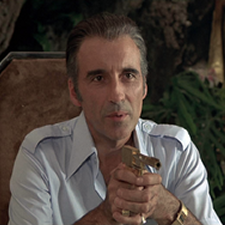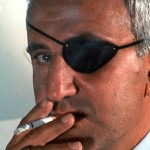 Why do some of James Bond’s enemies seek to be ‘friends’ with the MI6 agent? The word ‘frenemy’ was not invented for the Bond films, but there are some key moments over the course of the 25-film franchise when such a word seems very appropriate.
Why do some of James Bond’s enemies seek to be ‘friends’ with the MI6 agent? The word ‘frenemy’ was not invented for the Bond films, but there are some key moments over the course of the 25-film franchise when such a word seems very appropriate.
Dr. Julius No, for example, told Connery’s Bond in the very first 007 movie from EON, Dr. No (1962), that he thought there might be a place in SP.E.C.T.R.E. for our James, much to Bond’s disgust. Similarly, Christopher Lee’s Scaramanga in The Man With The Golden Gun (1974) sought out Bond’s friendship by claiming they were both skilled assassins pursuing the same trade. Roger Moore’s 007 dismissed this with the classic line ‘There’s a useful four-letter word, and you’re full of it’. Bond explained that when he killed, it was under orders and for King and Country, whereas Scaramanga was, in essence, just a thug for hire. Scaramanga was left in no doubt that any ‘friendship’ was most definitely not wanted by Bond.
What Makes a Memorable Villain?
A memorable villain, of course, is an essential ingredient to any James Bond film, and finding out the nature of his or her dastardly scheme is part of the pleasure of the Bond cinema experience for the audience. A strong baddie, exuding malicious evil, gives us opportunities to hiss and boo the villain and cheer on 007 as he takes apart the deluded scheme of the latest heartless brute he has encountered (think Blofeld, Mr. Big, Stromberg, Drax, to name just a few). Occasionally a villain appears to get satisfaction from the way Bond follows the clues and pointers and works out the nature of the dastardly scheme. Gert Frobe’s Auric Goldfinger almost encourages Bond to fully grasp the enormity and implications of his plan to contaminate America’s gold supply with a small-scale ‘atomic device’ and, as they bond over drinks, appears delighted when Bond grudgingly compliments him on the ingenuity of the scheme.

Sometimes a Bond villain evidently enjoys showing off their ’empire’ to Bond. It’s as if they cannot resist boasting to 007, relishing the stage before they can quickly kill him off (or so they think!). A good example of this is Adolfo Celi’s Largo in Thunderball, who invites Bond to his Nassau luxury residence and they share ‘small talk’ beside Largo’s swimming-pool and engage in some competitive clay-shooting. The pool, of course, doubles up in reality as a shark-pool, something Bond has to endure when he returns back there late at night. There is nothing subtle about Largo – his cruelty is plain to see, in a pretty stark way.
But there are times when Bond film directors can play with the audience, and a Bond villain (or villainess) may not be all that he or she appears to be (this comes across strongly in 1981’s For Your Eyes Only, and in 1983’s Octopussy). A number of the Bond villains have been highly intelligent and surprisingly nuanced in their ideas and behaviour. Moreover, the ego of a number of the main baddies in the 007 movies has been such that, when faced with an opponent of Bond’s stature and skills, they often end up having a grudging respect for our James, or seek to impress or even woo Bond with seemingly friendly talk.

This context has clearly influenced some of the actors who have taken on a ‘baddie’ role in the Bond franchise in recent years and who have carefully prepared for their role. Speaking in an interview he gave in September, 2020, and published in December that year in GQ magazine, Rami Malek said he believed Dr. No is the best of the Bond villains, and he especially loved the scene where Joseph Wiseman’s Julius No calls Sean Connery’s Bond ‘a stupid policeman’. As Bond fans know, this is shortly after Dr. No has tried to reach out to Bond, voicing his hope that, somehow, Bond could have been persuaded to defect and join SP.E.C.T.R.E. When Bond firmly rebuffs this idea, commenting that the only department he would like to join would be the ‘Revenge’ department, Dr. No realises that trying to persuade Bond to defect is a lost cause. At one stage in No Time To Die the main villain Safin (played by Rami Malek) tries to persuade a highly sceptical James Bond that they are, in many ways, similar. Bond does not agree, of course.
The ‘jousting’ between Bond and the latest villain is, arguably, very much at the core of the 007 adventures, and it is something that Ian Fleming emphasised in the original novels. Fleming also took an evident delight in describing his villains and their main physical features, together with their key flaws and foibles. The Bond author clearly recognised that we all love to hate a baddie, and it is something that the film franchise has never lost sight of, much to the delight of generations of James Bond aficionados. And long may that continue.
![Hugo Drax (Michael [Michel] Lonsdale)](https://www.007.info/wp-content/uploads/2012/05/MRDrax24.jpg)
Michael Lonsdale as Hugo Drax in ‘Moonraker’ (1979)
